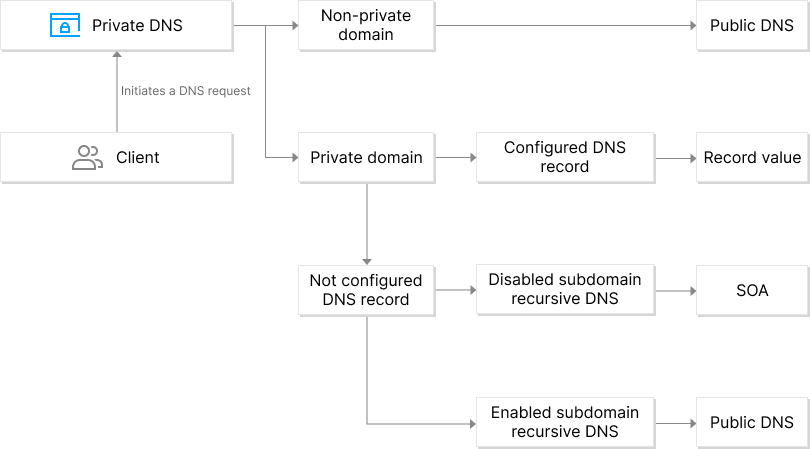Private DNS is a private DNS management service based on Tencent Cloud Virtual Private Cloud (VPC). It allows you to quickly build a DNS system in one or more custom VPCs and easily use private DNS records to manage Tencent Cloud resources associated with the VPCs that are externally inaccessible, such as CVM, CLB, CDN, and COS.
Private DNS
A secure, stable, and efficient private DNS service

Private DNS enables you to create custom private domains according to your needs. Such domains do not need to be registered on the public network and can be quickly noted and tagged for more flexible and convenient configuration.

By creating a private domain with a specified suffix and setting a PTR record, you can map IPs to the domain to implement reverse DNS, which greatly reduces the amount of spam and improves the visibility of the usage of IPs.

Private DNS supports load balancing based on CNAME, A, AAAA, TXT, and other records in the "random response" or "weighted round robin" modes. By setting the record value and weight, it distributes client requests to each server.

Private DNS allows you to filter and view request volume statistics by region, VPC, or domain name and stay up to date with your instance consumption details.

After "Subdomain Recursive Query" is enabled, when a domain name query does not match in the VPC, it will be performed recursively on the public network.

Based on DNSPod's industry-leading DNS infrastructure accumulated for over a decade and relying on Tencent Cloud's VPC service, Private DNS provides secure, stable, and highly available private DNS capabilities.

Private DNS enables you to create custom private domains according to your needs. Such domains do not need to be registered on the public network and can be quickly noted and tagged for more flexible and convenient configuration.
Private Network Access Hijacking
You can use Private DNS to create a private domain name, associate it with a VPC, add a DNS record for it, and set resource mapping to implement the private network hijacking feature. Then, when you access the private domain in the VPC, the mapped resource that you set in advance will be returned.
Tencent Cloud Service Resource Management
You can use private DNS records to manage Tencent Cloud resources such as CVM, CLB, CDN, and COS in VPCs. For example, you can plan the hosts of CVM instances according to the region, business scenario, server information, etc. and use the host information to add private domain names and DNS records for such instances. These private domain names are inaccessible outside the VPCs, which makes it easier for you to manage CVM resources.
Mutual Access Between Tencent Cloud Service Resources
You can connect VPCs with traditional IDCs through Direct Connect or VPN so that they can access each other's resources at private domain names, facilitating the intuitive use of Tencent Cloud service resources.
Tencent Cloud Service Resource Switching
- Generally, in order to ensure the stable operation of a high-concurrency business, the business is distributed on multiple CVM instances for them to share the pressure, and the same VPC can be established for such instances to enable mutual access between them at private IPs. However, when an instance is switched, its private IP will also change accordingly. Therefore, it is necessary to modify the business code and release the change, which is extremely inconvenient.
- In this case, you can create a private domain name for each instance in your VPC through Private DNS and add DNS records pointing to the corresponding private IPs. The instances can access each other at the private domain names, and when an instance is switched, you do not need to modify the code. Instead, you can simply modify the DNS record of its domain name.
How It Works
- You create a private domain "example.com" in a VPC and add a DNS record of "www host - CNAME record - domain.com record value". Then, if a client initiates a query for the CNAME record, as the record has already been configured, the result "domain.com" will be returned. If the client queries the A record of "test.domain.com", as it has not been configured, SOA will be returned.
- You create a private domain "example.com" in a VPC, enable subdomain recursive DNS, add a DNS record of "www host - A record - 8.8.8.8 record value", and configure it with a record value of "119.29.29.29" in the public authoritative DNS. Then, if a client initiates a request to query the A record, the result "8.8.8.8" will be returned. If the record of the private domain is deleted, "119.29.29.29" will be returned.

Private DNS is pay-as-you-go.
Private DNS is billed by the number of private domain names and DNS requests and settled by calendar day. If a private domain name is deleted in less than 24 hours after creation, the domain name itself will not be charged, but the DNS requests to it will still be charged. The fees are rounded to two decimal places. For detailed pricing, please contact sales.